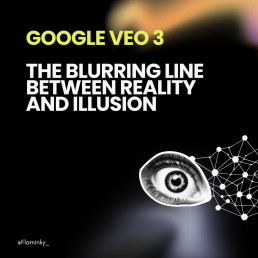
Google’s recent unveiling of Veo 3, its most advanced AI video generation tool yet, marks a massive leap in artificial intelligence — and not without consequence. With the ability to generate photorealistic, cinematic-quality video from text prompts, Veo 3 raises exciting possibilities but also serious concerns across industries and societies. From the world of cinema to the realms of misinformation, jobs, and creativity — nothing will remain untouched.
What Is Google Veo 3?
Think ChatGPT, but instead of words, it produces full videos. Veo 3 can create scenes from scratch based on natural language descriptions, add realistic camera movements, lighting, and even emotional tones to visuals. It can emulate specific film styles, recreate environments, and build entire narratives from a prompt. This isn’t just animation — this is AI-generated cinema.
The Future of Cinema and Content Creation
Let’s be honest: Veo 3 is a game-changer for filmmakers, marketers, and content creators. Agencies that once required entire crews, cameras, actors, editors, and thousands in production costs can now conjure an entire campaign with just a keyboard and an imagination.
On the flip side? Real creatives, from set designers to DOPs, may find their roles threatened.
This could give rise to a new kind of filmmaker — a “prompt director” — but what about the value of human-crafted stories, imperfections, and the magic of on-set collaboration? Will we crave authenticity in a world where everything can be perfectly faked?
Deepfakes, Fake News & Dead Internet Theory
Veo 3 brings the Dead Internet Theory uncomfortably closer to reality — the idea that much of the internet is no longer created or interacted with by real people, but by bots and AI.
Soon, you may not be able to tell if that video of a celebrity saying something inflammatory is real. Deepfakes, which once required high technical knowledge, are now democratised — and that’s dangerous. Combine this with political agendas, fake news, and conspiracy echo chambers, and we’re looking at a future where truth becomes optional.
Expect a flood of AI-generated media that’s indistinguishable from reality. And if people already distrust mainstream news, how will they cope when nothing can be verified?
The Scammer’s New Playground
Imagine receiving a video call or message from a loved one — or so you think — only to realise it was a scammer using Veo-like tools to deepfake their likeness. The tools that were once the preserve of high-end studios are becoming accessible to anyone. The scammer from Facebook Marketplace doesn’t need Photoshop anymore — they have Veo 3.
AI-generated misinformation could cause identity theft, reputational damage, and even geopolitical tensions. We’re not just fighting misinformation — we’re fighting hyperrealism.
Marketing Agencies and the Collapse of “Real”
From brands creating entire ad campaigns without shooting a single frame to influencers that don’t exist, Veo 3 may accelerate the AI-first marketing era. It’s cheaper, faster, and often indistinguishable from real footage. But as more brands embrace it, the human touch — that raw authenticity that builds trust — may start to erode.
What happens when every influencer is AI-generated, every advert a prompt, every model digitally sculpted?
The Creativity Question
Veo 3 brings us back to the central question: What is creativity in the age of AI?
Are we entering a post-human artistic phase, where ideas matter more than execution? Or are we devaluing the skill, effort, and emotional depth behind human-made art?
There’s no doubt AI tools like Veo 3 can assist creatives — offering new ways to ideate, prototype, and tell stories. But we must also be aware of how easy it is to let the machine do all the work — and how quickly human talent can become undervalued, or even obsolete.
Final Thoughts: A Fork in the Algorithm
Google Veo 3 is both a revolution and a warning. It offers power, convenience, and breathtaking possibilities — but also a mirror to the darkest parts of our digital culture: manipulation, job displacement, surveillance, and the erosion of truth.
As we marvel at what’s possible, we also need to ask better questions: Who controls these tools? Who verifies what’s real? Who gets left behind?
At Flaminky, we celebrate the intersection of culture, tech, and society — and right now, we’re at one of those defining crossroads. The future isn’t just coming fast… it’s being generated.
